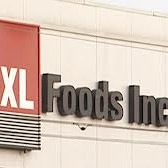 Brazil-based JBS SA, the parent company of JBS Australia, has announced that a subsidiary yesterday signed an agreement to take control of some of Canada’s largest beef processing operations.
Brazil-based JBS SA, the parent company of JBS Australia, has announced that a subsidiary yesterday signed an agreement to take control of some of Canada’s largest beef processing operations.
The management agreement with XL Foods, Canada’s second largest beef processor, also includes an exclusive purchase option over a number of XL’s Canadian and US operations.
The US business will continue to be operated by XL Foods during the option period.
In a statement to the market today, JBS’s investor relations department said the company’s US division would provide management services to XL’s 4000 head-per-day Lakeside beef processing plant in the province of Alberta.
The trouble-plagued XL Lakeside plant’s licence to operate was suspended in late September after being implicated in Canada's largest-ever e.coli bacterial contamination food safety recall, linked to mechanical tenderisation of certain meat items. The products were exported to more than 20 countries, including the US, where the contamination was detected in routine sampling.
At least 15 Canadians in four provinces were sickened with E. coli O157:H7 poisoning after eating meat processed by the XL plant.
In a second part of the agreement reached yesterday, JBS US also negotiated the exclusive option to purchase a number of XL assets, including:
- the Brooks (Alberta, Canada) packing plant with processing capacity of 4000 head/day.
- the Calgary (Alberta, Canada) packing plant with processing capacity of 1000 head/day.
- XL’s 70,000 head capacity Brooks feedlot in Alberta, and 2800ha of farming country adjacent to the feedlot.
- XL’s Omaha (Nebraska, USA) packing plant, with processing capacity of 1200 head/day.
- XL’s Nampa (Idaho/USA) packing plant with processing capacity of 1000 head/day.
Should it decide to purchase the XL processing and feedlot assets in Canada and the US, JBS has agreed to pay US$100 million – half of which would be in JBS company shares and half in cash.
The greatest significance in the announcement is that JBS will now be able to expand its North American production platform. Its only option for some time has been Canada, after the US Justice Department prevented JBS from acquiring National Beef Packing as well as the Smithfield Beef Group in 2008-2009.
Beef Central's North American sources say the XL Calgary (Can) and Nampa (US) plants have been closed for some time, and are unlikely to be re-opened by JBS.
That means with the remaining plants, a purchase deal would add a further 5200 head/day to JBS’s North American beef processing capacity.
Based on reliable 2011 statistics, its current capacity, through eight US factories is 28,850 head/day – exceeded only by Cargill with 30,000 head and Tyson Foods, 28,900 head.
JBS’s figure does not include its JBS Pork or Pilgrim’s Pride chicken processing businesses, however, which easily make it the largest meat protein processor in North America.
JBS would not assume any of XL Foods’ debt or liabilities in the event of a purchase, the company statement said.
XL Foods, a privately-held company, is the second-biggest meat packer in Canada.
Last week, the Canadian Food Inspection Agency gave the company the go-ahead to resume limited operations at its Lakeside plant. The agency has assured the public that no meat would leave the abattoir until it was proven safe for consumption.
The beef carcases that have been fabricated at the plant since last Friday, had been hanging in the coolers since the plant’s operating license was suspended by CFIA on September 27.
"Lots of 'dry-aged' beef," one of Beef Central's local contacts said.
In a statement, XL’s chief executive Brian Nilsson said the management agreement with JBS was “another positive step” to relicensing the Lakeside plant, following the recent closure.
A Union official from Canada's United Food and Commercial Workers was quoted in local media this afternoon as saying JBS’s arrival on the scene was a positive development.
“I’m not normally in favour of foreign control and ownership, but the Nilsson brothers (current owners of XL) were in over their heads,” the spokesman said.
“They can go back to running their ranches now and leave the operation of this plant to someone who knows what they’re doing.”
There was a general uneasiness about 'foreign ownership' of Canada's meat processing infrastructure evident in on-line comment, posted since the announcement.
